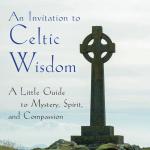Carl:
We are 98% on the same page. The 2% shows up with your last statement. I’m a little wary of the bard’s quotable declaration, mainly because of the rampant narcissism in our culture. We can be true to our own selves all the way to the First Bank of Self-Worship. So I tend to balance “to thine own self be true” with “Love is Real” — and just like any religion can sometimes lead us away from love, so too, the uncriticized self can do the same. So be authentic, as long as that includes a healthy willingness to be at least as non-attached to the self as we are to anything else (including religion).
And FWIW, I agree with yours (and Cynthia’s) assertion that sometimes we have to let go of religion in order to be true to God — but I’m also wary of how there has tended to be in our culture a throwing out of the mystical baby with the religious bathwater. I’m concerned that far too many people abandon religion not in order to grow spiritually, but in order to avoid the hard work that spiritual growth entails. So once again, a blanket statement just doesn’t work. Sometimes, the very thing we need is to stay put, right in the religion that feels really uncomfortable! Because it’s teaching us how to love.
FWIW, I do believe that in their *healthiest* forms, sacramental Christianity, Mahayana Buddhism, and mainstream-to-liberal Judaism all have the capacity to support a person as they grow all the way into complete non dual union with the Divine. That’s probably true of Sufi forms of Islam and of Vedanta as well, but I’m just not as familiar with those traditions. So sometimes, what we need is not to abandon religion, but to do the hard work to find the healthiest expression of it — and then dive deep.
Aaron:
I agree on the point of the bard. To me being true to oneself and being authentic requires love. Genuine love. And I’m glad you qualified your definition of love. Because love too can be a form of narcissism. Also taken to extremes it can be a form of obsession. Being authentic and being in Love for me is the same thing, be true to oneself (as in finding what brings Love, peace of mind, and happiness to you that enables you to live life more abundantly). So I should have qualified that more. Fair point my friend.
As for the other two points I’m gonna push back a bit. For fun and the sake of dialogue amongst friends here. Throwing the mystical baby out with the bath water isn’t a cultural thing. Far too many of the people still inside the religious institutions themselves do that already. Mysticism makes people uncomfortable. So we see a huge rise in fundamentalist belief. Even in liberal sections of the religious institutions mysticism is rare. Both my undergraduate and graduate work, at liberal Christian universities, in theology and philosophy, were very thorough but also very much was devoid of anything mysticism. And this isn’t just a recent thing. I think back to your interview with Rohr. He hits the nail on the head multiple times on this, showing it’s been done for a while, because it’s easier to worship Jesus than to follow him.
All that to say, playing devils advocate, if god can be reached both authentically and genuinely, mystically , in Love, regardless of the path and religion chosen, why do I need to stay with the religion of my education and birth if it’s not speaking to me or nourishing me? It’s not necessarily true that I’m leaving because of my culture anymore than it is that those who stay are anymore prone to finding authentic mystical truth. And if truth can be encountered anywhere there’s no point in staying in a place on the slim chance of finding such an expression and experience in (this instance) the church when the majority of both the fundamentalist and the liberal don’t have that.
But why do we cling to the abrahamic truths and religious institutions? Yes, a minority of us can find truth, and mystical truth at that, there. Why do we tell them don’t give up and and don’t leave, because we have the mystical tradition here too, it’s just hidden and rare, and outside of the internet you won’t find many in your local parishes that are like that. This is my point and I take Cynthia’s as well (though I by no means represent her). Yes we have a mystical tradition in our tradition and institution. But can we become too attached to the institution and tradition? so much so that we stay in it no matter what? Even if it’s causing suffering and it’s not fulfilling, because there is a slight chance of finding that mystical baby?
This to me is where I take a 2% disagreement with you my friend. Why do I need to cling to an institution. Why defend the abrahamic traditions above the others? Why not leave? Why do I need to dig deep into a faith that in the majority on both sides has abandoned the mystical path as unnecessary? When I can find one, like druidry or Sufism for example, that is steeped in tradition and mystical experience and replete with others there to support me for the same thing. Especially since the abrahamic traditions are no more truth than the others? Why cling to one metaphor over all others? If you love that tradition (like I feel you do, I see it in your writing) that’s one thing, and possibly worth the struggle and the risk of being different from the majority. But for some, we aren’t attached to that tradition. That myth (in the Joseph Campbell sense) doesn’t nurture our journey to divine union. To me it makes sense to find the right metaphor rather than cling to one out of loyalty. The church has the mystical vein, it’s just rare. I choose to say rare over difficult, because many traditions are mystical, and many are more obviously and strongly in touch with that mystical tradition, and it is just as difficult a path to walk there as in Christianity. The difference being is it’s largely unheard of in Christianity outside of a minority’s of seekers and monasteries.
So I don’t think one needs to be loyal to an institution to find the mystical truth. I don’t think one needs to dive deep. I think one needs to explore what is enriching and enlivening, and go do that. Not clinging to a tradition but pursuing truth. And truth may lead you elsewhere. But though it seems a different path, in the end it’s all the same goal. Like Matthew Fox says. There are many wells, but one river.













